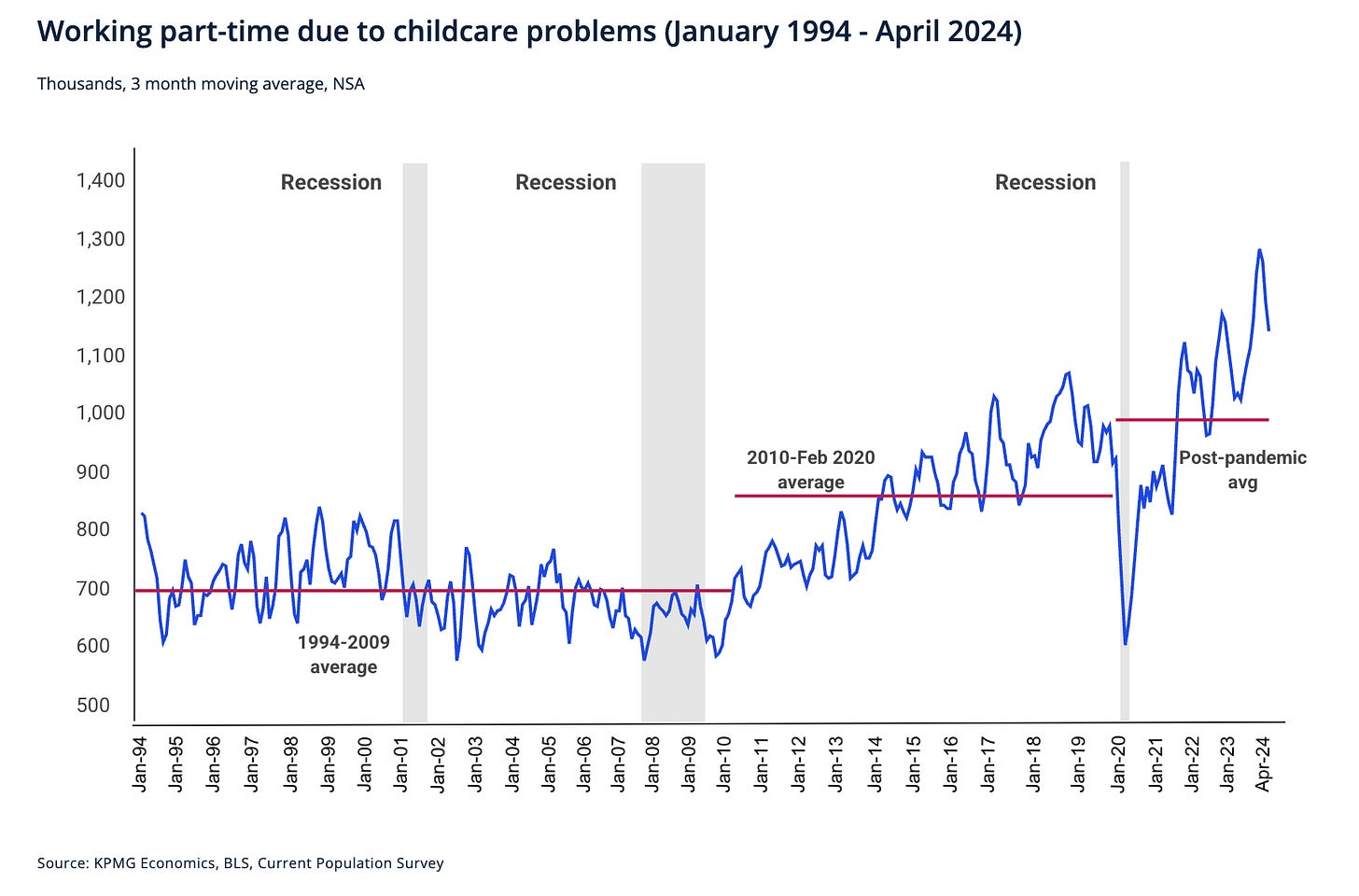Struggling Parents, Struggling Economy: The Connection We Can't Afford to Ignore
Childcare is an economic crisis masquerading as a personal problem.
When pop sensation Chappel Roan recently observed that none of her friends with young children have "light in their eyes," social media erupted.
The singer's comments on the "Call Her Daddy" podcast sparked fierce debate. But for many parents, her words simply validated what they already know: Parenting in America shouldn't be this difficult.
When friends with young children confide in me about their struggles, I often whisper, "It gets better."
But here's the thing—the joy of raising children shouldn't require surviving years of exhaustion, financial strain, and career sacrifice. The fact that so many parents found Roan's comments validating doesn't mean parenting is inherently miserable—it means our systems are failing families.
For six years, we've been running the annual Parent Confidence Index with KinderCare, tracking the silent crisis unfolding in American homes. Our latest report, featured in Forbes and the Financial Times, puts numbers to what Roan observed.
But here's what everyone misses: This isn't just about tired parents or fussy toddlers.
This is an economic crisis masquerading as a personal problem.
When 53% of parents fear career setbacks due to parenting responsibilities and 71% believe the gender pay gap directly results from America's lack of childcare support, we're not witnessing individual struggles – we're watching a system that doesn’t support the modern workforce and further weakens our economy.
The Return-to-Office Realities: Mandates Without Support
Our latest KinderCare data reveals a troubling disconnect: companies are mandating returns to the office without addressing the childcare crisis this creates.
Roughly half (49%) of working parents say, "I feel like I was forced to return to the office"
RTO parents are now performing two full-time jobs simultaneously – their paid work and their unpaid childcare coordination in a system that is not fully operational, in a country that provides less support than virtually any other developed nation.
53% of working parents agree, “I am worried that I will have to step back from my career to take on my parenting responsibilities.”
72% say, "It would be impossible to do my job without high-quality childcare."
As highlighted by KPMG, the post-pandemic childcare landscape remains fundamentally broken. Companies that ignore this reality should expect widening gender gaps and missed growth opportunities that come with supporting families.
The Rising Wave of Parental Anxiety
Parents aren't just struggling with today's challenges—they're bracing for worse to come:
54% worry their company will scale back childcare benefits to cut costs (a 10% increase from last year)
80% say, "When companies cut childcare benefits, it feels like a slap in the face as a working parent."
71% constantly think about childcare gaps, a 7% increase from 2023
This isn't unfounded anxiety—it's a rational response to the state of childcare in America.
When childcare costs more than college tuition in 38 states and exceeds rent in 17 states plus DC, parents aren't just stressed—they're doing impossible math every day..
HR Knows Better, But C-Suite Isn't Listening
One of the most striking findings in the 2025 KinderCare CHRO Perspectives survey reveals a profound disconnect between HR leaders and C-Suite executives.
Fortune 500 HR leaders overwhelmingly recognize the business case for childcare support:
85% believe childcare benefits reduce employee turnover
86% say these benefits help attract talent
82% report that childcare support enables employees to excel professionally
As Fortune featured, 78% of HR leaders report difficulty convincing the C-Suite of the long-term return on investment on childcare benefits. This isn't just a failure of corporate imagination—it's a failure to recognize that parents are the backbone of the American workforce.
The Consensus: What Parents Want

Despite the manufactured culture wars around parenting, our data shows remarkable consensus on solutions:
80% believe childcare is a national issue that should be federally addressed and funded
45% hope universal childcare will be federally supported in their children's future
46% hope women won't have to leave the workforce for childcare reasons when their children grow up
59% of parents would rather have their employer subsidize childcare costs than receive a raise – a 10% increase from last year
This isn't just about money; it's about a system that works.
Imagine an America where childcare isn't a luxury, but a public utility, where parents don't have to choose between career advancement and being present for their children. Mothers didn't lose 40% of their lifetime earnings simply for having children.
This isn't some utopian fantasy – it's the reality in many countries with which we compete economically. When we fail to support parents, we not only hurt families but also hinder our economic future.
The Business Imperative: Caring as the New Market Strategy
We're in what we've called "The Redirection Economy," where consumers are making values-based decisions about where they spend their money and their talent. When 83% of parents agree that "how a company supports its employees who are parents reflects how it cares for its employees overall," they are conveying a crucial insight into how they define brand value.
Childcare isn't a "women's issue" or a "family benefit" – it's core business infrastructure. The companies that understand this aren't just nice – they're smart. For example, Hewlett Packard Enterprise believes an extremely generous paid parental leave is one of the best ways to retain employees.
As flexibility becomes the new salary and parents prioritize support over base compensation, companies face a choice: adapt to the reality of their workforce or lose them to competitors who will.
The signals have been flashing red for years. The question isn't when we'll notice the childcare crisis – it's whether we'll act on it.
A big shout-out to our fantastic research partners at Kindercare, Morgan Rentko, and Saskia Gregg, who led the research.
3 Links
Curiosity is contagious; if you like this newsletter, please share it!!
Penned by Libby Rodney and Abbey Lunney, founders of the Thought Leadership Group at The Harris Poll. To learn more about the Thought Leadership Practice, just contact one of us or find out more here.













Important issue! I’m afraid the current regime wants women to stay home. They have no idea how much they need women in the workforce. They are the C-suite x 100. 👹